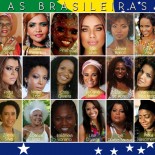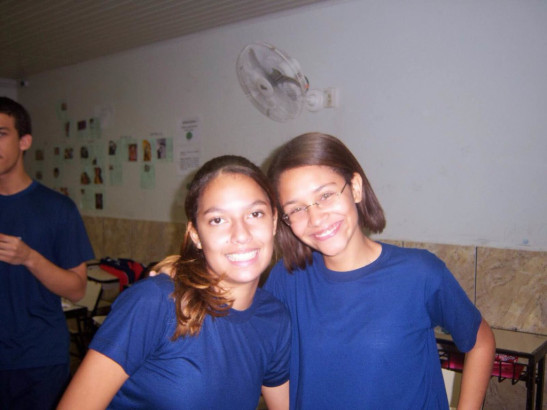Beyond the aesthetic question, kinky/curly hair is a symbol of
resistance against racism: after straightening for years,
woman feels empowered with natural hair
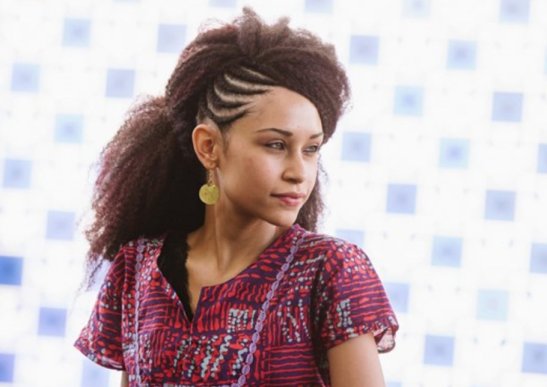
Note from BW of Brazil: The discovery of the beauty in kinky/curly hair is a process that tens of thousands of Afro-Brazilian women are experiencing these days (see hereand here). Obviously more than simply an issue of beauty aesthetics, it is a symbol of the struggle against the racist concepts of the beautiful and the ugly that permeate Brazilian society. The fact that the story below is so common among black women reveals how people of visible African ancestry struggle with self-acceptance when everyone is taught to believe that certain features, such as straight hair, are better than others. Below is yet another example of the natural hair revolution that is has slowly taken place in Brazil over the past few decades.
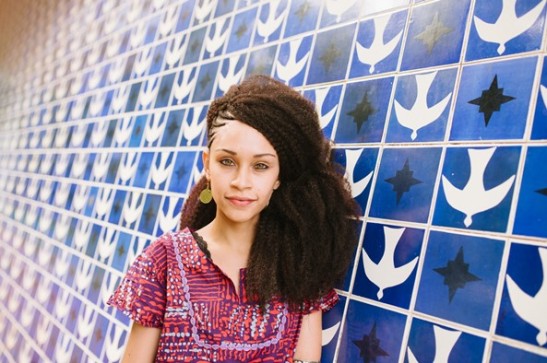
Beyond the
aesthetic question,
kinky/curly hair
is a symbol of
resistance against racism
Stories such as that of the publicist Raísa Azeredo,
who started straightening her hair as a child and
today loves her roots, show the importance of the
empowerment of black women
By Clarissa Jurumenha
Wearing natural hair is an act of resistance against the dictatorship of the chapinha(straightening iron). The prejudice embedded in terms such as “cabelo ruim” (bad hair) and “cabelo bom” (good hair) demonstrates that there is still much to conquer in the face of racism, which dwells in the details.
“Why did you do this to your hair?”
“Was your hair is born this way?”
Girls and women with cabelos crespos (kinky/curly hair) find themselves faced with such questions often. In recent years, however, they have worn natural hair as an important part of the fight against discrimination.
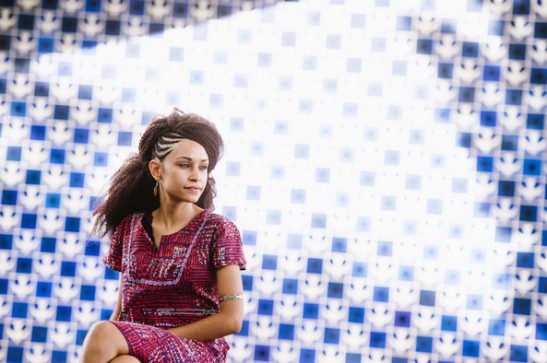
Wavy, curly, kinky/curly, voluminous, “black power” (afro), dreads, rastafari … There are numerous ways to wear one’s tresses. The first step is to break wth harmful chemical procedures to the wires and initiate the so-called hair transition. Raísa Azeredo’s life story resembles that of many women who have kinky/curly tresses.
She was taught while still a child to straighten it. She even got sick because of the smell of formaldehyde in a session of escova progressiva (Brazilian Keratine Hair Treatment). “There were a lot of chemicals, in a closed environment, and sure enough: I felt sick. But at the time, I didn’t give up and I wanted to straighten it anyway,” she recalls. Raísa’s mother wanted to protect her from prejudice, so she allowed her to straighten her hair. “The society stamps (the idea) that kinky/curly hair is bad,” comments the publicist.
“When I accepted myself, the world came to accept me”
At the end of her third year of high school, Raísa decided not to straighten her hair any more.
“On graduation day, I decided to no longer face that situation. Passei máquina dois (got a short haircut). I cried too much for my mother and put in some braids. From there, I never went back.” – Raísa Azeredo
A specific treatment process for her hair then started. She knew ways to moisturize, nourish and rebuild it so it would stay healthy naturally. The process of transformation she opted for is called “Big Chop” when you remove the straightened hair and leave the hair 100% as it is.
“There are a lot of black women who don’t know their hair. I didn’t, I did not know how it would be all crespo. My type of strand takes a while to grow, but I noticed a range of different possibilities of hairstyles. I can do braids, I can do dreads, there’s many things.” – Raísa Azeredo
Raísa has heard all sorts of offenses: “are you going to comb your hair?” and “cabelo de macaco” (monkey hair) had become common phrases. “It’s not victimismo (playing the victim), we actually hear these kinds of comments.”
“When I accepted myself, the world accepted me. This is me, this is my personality. Eu sou negra (I’m black) and my strands are crespo, period!” – Raisa Azeredo
It was necessary to earn respect in various spaces. She studied advertising at a private college with mostly alunos brancos (white students). “I remember them asking me things like: ‘why do you dress like that?’ or, ‘Why don’t you comb your hair?’’ she says.
Prejudice without borders
Raísa spent a period traveling through Europe after graduating in advertising and propaganda. She came to a conclusion: prejudice has no borders. “I left the house wearing a turban once. I arrived at the door of a party and security told me to take it off, because I would not enter the party house with ‘that thing on my head’. It doesn’t happen only in Brazil, the prejudice is in the world,” she comments.
Greater social acceptance – and the long road ahead
The strength of the ideas advocated by social movements and the emergence of virtual groups help to spread diversity. In these spaces one can see the unity and the strength of the women who gather in search of information to abandon the imposed standards. To help them in this process, the range of products specific to each type of hair only increases.
When dealing with curly or kinky/curly hair, the care is different from straight hair. In Raísa’s case, she washes her hair three times a week and does a weekly massage. Her favorite leave-in cream is Nutri Hair, for hair definition. For massage, she uses NOVEX Argan Oil. “It’s always a discovery, I try to use new products to experiment and see what happens,” she advises.

The blog Transitei has several articles of care for curls. Based on the opinion of readers, the creator Adriana Adéa has assembled a selection of cheap creams that contribute to the formation and care of the cachos e crespos (those with curly and kinky/curly hair).
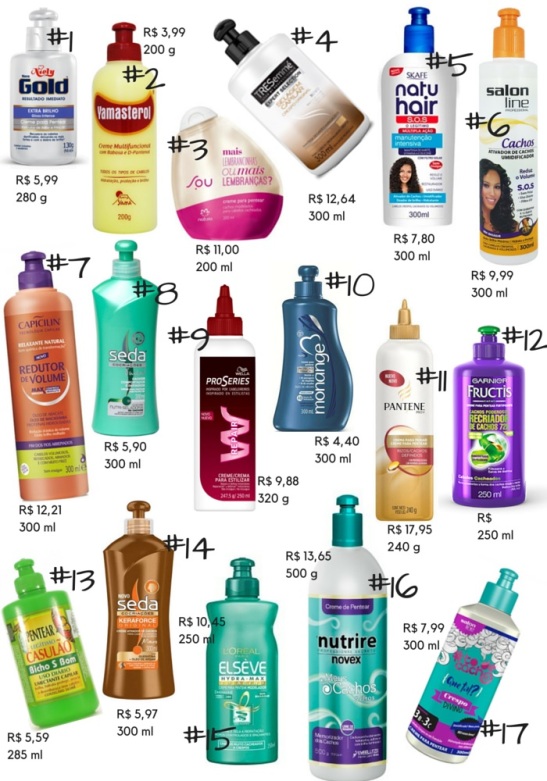
Direct care in the salon
Salons specializing in rasta, crespo and cachos in Brasília:
Salão Cachos Brasil
SDS Bloco “G”, Loja 17 – Conic
QSB 6, lote 28 loja 1 – Taguatinga Sul
Ceilândia Centro
Telefone: 3275-1011
Cabelo com C
203 Norte, Bloco D – Asa Norte
Telefone: 3034-7787
Afro Itinerante de Brasília
Serviço domiciliar feito por Layla Moreno
Telefone: 92289669
Salão Afro & Cia Ponto Chic
Conjunto 1B, Lote 23, Loja 1 – Quadra Qs 12 – Riacho Fundo
Telefone: 3399-8784
Salão Afro Rainha de Sabá
Conic, Edifício Miguel Badia, Bloco L, Loja 43
Telefone: 3322-9902
Salão Beleza Afro
Conic, Edifício Acropol, Bloco N, nº 31
Telefone: 3321-4120
On the movie screen
The appreciation of cabelo crespo and of identidade afro (afro identity) is portrayed in the documentary “Das Raízes à Pontas” (from the roots to the tips), directed by Flora Egécia and released on Tuesday, November 17th at Cine Brasília. The film covers the experiences of different people in relation to living with their natural strands and invites the debate on the aesthetic impositions of the current beauty standards.
Source: Metrópoles

